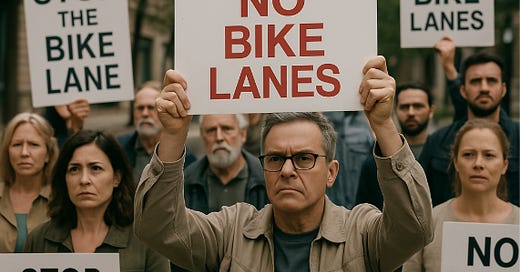Should provincial governments have the power to give mayors special authority to override their own city councils?
Legally? Yes.
Should they? That’s a different story and it cuts to the core of how democracy works in Canada.
Across the country, a troubling pattern is emerging: provincial governments, frustrated with local decisions, are increasingly stepping in and reengineering municipal democracy from above. And oddly enough, it often seems to come down to one surprising battleground: bike lanes.
In Calgary and Edmonton, Alberta Premier Danielle Smith’s UCP government has repeatedly intervened in city planning, including in local transportation priorities. (and continues to want to interfere-LEAVE EDMONTON ALONE)
In Toronto, Premier Doug Ford has overridden council decisions, cut the size of city council mid-election, and granted "strong mayor" powers that allow the mayor to pass bylaws without majority support.
And just today in Halifax, Nova Scotia Premier Tim Houston signaled he wants to give the newly elected mayor “strong mayor powers” again, tied to disputes over bike lanes and traffic planning.
Under Section 92 of Canada’s Constitution, municipalities have no constitutional status. Cities and towns exist only at the pleasure of the province. That means if a provincial government wanted to dissolve all city councils, fire every mayor, and appoint bureaucrats to run each municipality, it could. Totally legal.
But legality isn't the same as legitimacy. In a democracy, we don’t govern communities from the top down, we trust people to elect representatives who know their communities best.
And that’s why we have city councils: to reflect the diversity within cities themselves. Voters in downtown Halifax may want protected bike lanes. Voters in suburban Dartmouth may not. That’s why we elect a mayor to bring the city together, and councillors to represent each district’s unique needs, from zoning to garbage collection to school safety.
If voters aren’t happy with how their city is run, they can vote for a new councillor or a new mayor. That’s how democracy is supposed to work.
But in this new era of “strong mayor” powers, a premier can bypass the will of voters entirely. Tim Houston wants to give Halifax’s mayor the power to override bylaws, pass new ones unilaterally, and silence the very councillors that voters chose to represent them.
Be Careful What You Wish For…….
Yes, Houston could use these new powers to kill bike lanes or fast-track projects. But power cuts both ways.
What happens when a premier you didn’t vote for gets into office and starts meddling in your town? What if they force new developments your community opposed? Or remove protections your council passed?
This isn’t just about Halifax. It’s about who gets to decide what your community looks like. Local democracy isn’t perfect, but it’s better than a top-down, one-size-fits-all approach imposed by a government hundreds of kilometers away.
We are witnessing a slow, quiet erosion of municipal power in Canada. If we believe in democracy, we must defend it, not just in Parliament, but in every ward, every neighborhood, every small town, and every city council chamber in this country.
Because if the people you voted for can simply be overruled, did your vote ever matter at all?





100% provincial governments should stay out of municipal politics. I’m so angry that the UCP govt keeps interfering (like why do we need parties at any level, nevermind the municipal level?). It’s maddening.
In BC the Minister of Housing is overriding development planning in our cities and municipalities. He has given building “quotas” that are to be met.